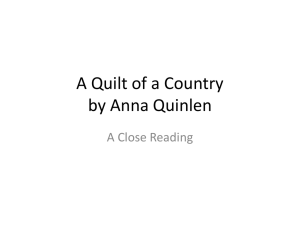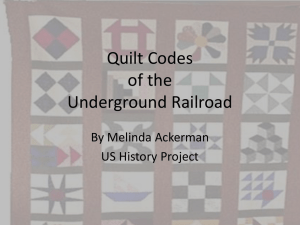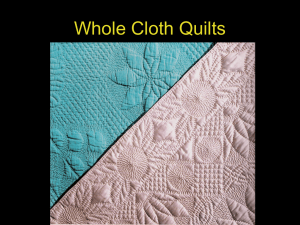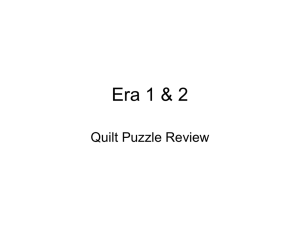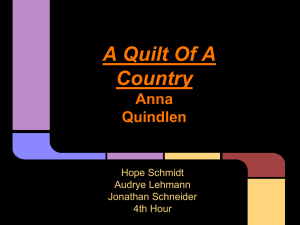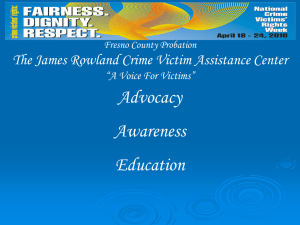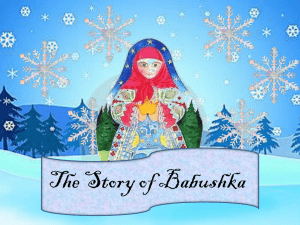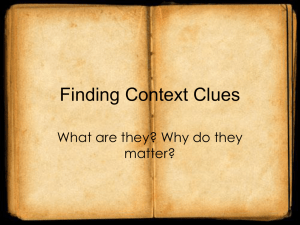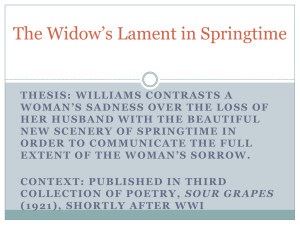The Keeping Quilt
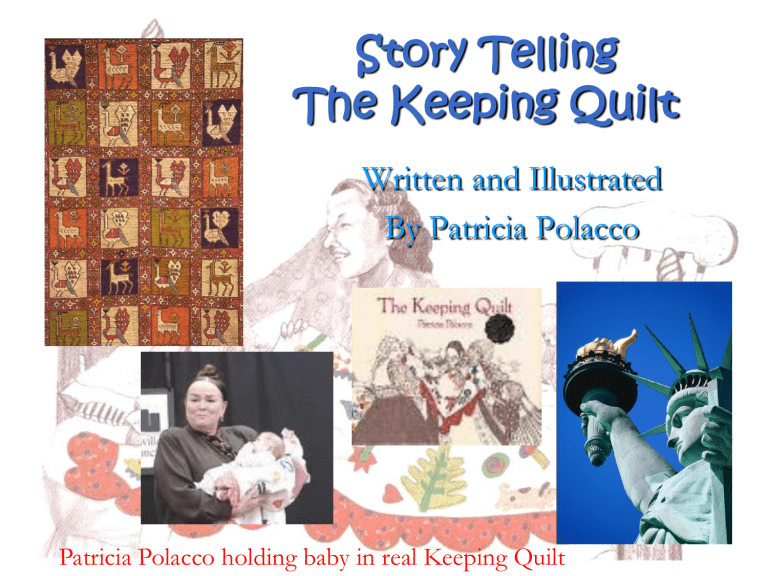
Story Telling
The Keeping Quilt
Written and Illustrated
By Patricia Polacco
Patricia Polacco holding baby in real Keeping Quilt
Objectives
This week you will:
Practice recognizing prefixes mis-, and suffixes –ing and –ed, added to a base word.
Practice recognizing words with the long /e/ sound
Practice recognizing the /kw/ and /skw/sounds spelled qu_ and squ_
Use comprehension strategies :
Monitoring and adjusting reading speed and predicting
Use comprehension skills : fact and opinion
Write a mystery narrative
Practice using capitalization correctly
Practice recognizing words with foreign origins
Word Knowledge Day 1
understand understanding misunderstanding celebrate celebrated celebration celebrity
What do these words have in common?
– They have a base word with an affix. Let’s underline the affixes.
Word Knowledge Day 1
scrapped scraped stripped striped pinned pined
What do you notice about these words?
– These are base words with an affix –ed.
When you add –ed to a base word with a short vowel you double the final consonant and add –ed.
When you add –ed to a base word with a long vowel you just add –ed.
Word Knowledge Day 1
piece belief field shield handkerchief
Do you see any spelling patterns in these words?
– They all have the long /e/ sound spelled ie.
quilt
This word is found in our selection and has the /kw/ sound spelled qu_.
Word Knowledge Day 1
In New York City her father’s work was hauling things on a wagon, and the rest of the family made artificial flowers all day.
Everyone was in a hurry, and it was so crowded, not like in backhome Russia.
To show he wanted to be her husband, he gave Anna a gold coin, a dried flower, and a piece of rock salt, all tied into a linen handkerchief.
– Circle any words with an affix or long /e/ sound.
Word Knowledge Day 1
A quilt is made from pieces of fabric sewn together.
Which word has the /kw/ sound spelled qu_?
Build Background
Activate prior knowledge
We are going to read a story called “The
Keeping Quilt” it’s about a special quilt that gets passed down from generation to generation.
Do you have any stories or family heirlooms?
Does anyone have a story or item that has been passed down?
Background Information
The Keeping Quilt is a true story. The author’s family came to America from another country.
In the Jewish tradition, the Sabbath is
Saturday rather than Sunday. Many Jews begin Sabbath at sundown on Friday evening.
The quilt in the story was passed down from many generations in the author’s family.
Preview and Prepare
Reading 2.6
Let’s read the focus questions, title and author together.
Now let’s look at the first page or two for clues, problems or wonderings.
Clues:
Unusual clothes
Problems backhome
Wonderings
Why so many scarves?
Clues unusual clothes
Student Observation
Problems Wonderings backhome Why so many scarves?
hauling artificial flavor bouquet handkerchief
The Keeping Quilt
Selection Vocabulary
hauling pulling or moving with force
In New York City her father’s work was hauling things on a wagon, and the rest of the family made artificial flowers all day.
The boys are busy hauling firewood inside so we can make a fire in the fireplace before dinner.
artificial made by people, not natural
In New York City her father’s work was hauling things on a wagon, and the rest of the family made artificial flowers all day.
The bowl of artificial fruit looked almost as good as real fruit.
handkerchief cloth used to wipe the nose or face
To show he wanted to be her husband, he gave Anna a gold coin, a dried flower, and a piece of rock salt, all tied into a linen handkerchief.
My aunt has a silk handkerchief with her initials stitched on one corner.
flavor a particular taste
The gold was for wealth, the flower for love, and the salt so their lives would have flavor.
The flavor of the soup was spicy and delicious.
bouquet a bunch of flowers
My mother wore a suit, but in her bouquet were gold, bread, and salt.
Sally picked daisies and clover to make a bouquet of flowers for her mother.
“The Keeping Quilt”
Draw a line from the word to it’s definition and it’s picture bouquet, flavor, hauling, artificial, handkerchief made by people, not natural a particular taste cloth used to wipe the nose or face a bunch of flowers pulling or moving with force
First Read
Student Anthology
Reading 1.3, Listen/Speak 1.9
We are going to read “The Keeping Quilt” pages158-163.
While we are reading we will use these comprehension strategies:
Monitoring and Adjusting Reading Speed
Predicting
pulling or moving with force made by people rather than nature
Monitor and Adjust Reading Speed
•I’m not sure what the writer means by “backhome.”
It’s written as one word. That seems strange. I need to slow down while I read to understand what the author is trying to say here.
•Okay, now I see that the narrator’s family moved from Russia to New York. They found their new home very different from life in Russia. Russia is what the narrator means by “backhome.”
a head scarf shaped like a triangle
Monitoring and Adjusting Reading
Speed
•I see a word that I don’t understand here— babushka. Maybe if I slow down my reading speed and look at the illustrations while I read I can figure it out.
•The story tells me that the little girl liked to throw her babushka in the air. In the picture, the girl is throwing something in the air. It must be her babushka. In the picture all the women and girls are wearing big scarves on their heads. I guess that’s what a babushka is.
a bread, which is often braided, made with eggs. Challah is eaten on the Jewish
Sabbath.
a cloth use to wipe the nose or face taste or specific quality
Speed
•There’s a lot of information here in this list.
Let’s slow down our reading speed and see what becomes clearer. like a tent above the bride and groom in a
Jewish wedding
a bunch of flowers
Predicting
•What will happen to the quilt now?
•I’ll think carefully about what I’ve read so far in the story and what I can learn from the story’s pictures.
•I know that the quilt is used on special occasions, like a wedding and the birth of a baby.
•I predict the narrator will use the quilt at her wedding and when her child is born.
•After I finish reading the story I’ll check to see if my prediction came true.
Confirming Predictions
•My prediction was confirmed. The narrator/author, Patricia Polacco, did use the quilt at her wedding and again as a blanket for her baby daughter, Traci Denise.
Discussing Strategy Use
Reading 2.4
What questions did you ask as you were reading?
What predictions did you make?
How did you adjust your reading speed?
Investigating Concepts
Beyond the Text
We are going to do pages 122 and 123 of our
Inquiry Journals.
English Language
Conventions
Eng. Lang. Conv. 1.7
Mechanics: Capitalization
We are going to read pages 275-277 in our Language
Arts Handbook to learn about the rules of capitalization.
G randpa and I cooked G randma a big dinner for their anniversary.
Proper nouns: Grandpa Grandma Pronoun: I
P rincipal A ngelM artin took the Q ueen E lizabeth II across the A tlantic O cean.
Person’s title: Principal Proper nouns: Angel-
Martin, Queen Elizabeth II; Name of Ocean:
Atlantic Ocean
Let’s do pages 150-151 in our Comprehension and
Language Arts Skills workbook.
challah
Spelling
Eng. Lang. Conv. 1.8
This week we are learning words with the spelling pattern qu and squ pronounced /kw/ and /skw/
– The word from our selection that contain this spelling pattern is:
Babushka
quilt
– Let’s take our Spelling Pretest
Vocabulary Skill Words babushka challah huppa handkerchief bouquet
Writing Process Strategies
Writing 2.0
Writing A Mystery
Let’s read pages 130-133 of our Language Arts
Handbooks to learn about writing a mystery.
Let’s think of some ideas for a mystery that have a family storytelling theme like:
– missing homework
– unsigned card
– a tree that has started to grow where no one planted it
Formal Assessment
Characters and setting are clear. (2 points)
The clues lead to the solution. (2 points)
The solution makes sense. (2 points)
Suspense or surprise was used. (2 points)
Words are spelled correctly. (1 point)
Paragraphs are indented. (1 point)
Developing Oral Language
understand understanding misunderstanding celebrate celebrated celebration celebrity scrapped scraped stripped striped pinned pined piece belief field shield handkerchief quilt
Let’s make clues for these words and have the other students guess what the word is.
Second Read
Student Anthology
Reading 2.6
We are going to read “The Keeping Quilt” pages158-163.
While we are reading we will use these comprehension skills:
Fact and Opinion
A fact is a statement that can be proven to be true.
An opinion is a statement that can be supported but not proven to be true.
Fact Opinion
In New York City her fathers work was hauling things on a wagon, and the rest of the family made artificial flowers all day.
It (the quilt) will be like having the family in backhome
Russia dance around us at night.
Fact Opinion
The family ate challah and chicken soup.
The quilt was the tablecloth.
Carle and George moved to a farm in
Michigan and Great-
Gramma Anna came to live with them.
The gold was for wealth, the flower for love, and the salt so their lives would have flavor.
Married you’ll be someday.
Fact Opinion
Mary Ellen took the quilt with her.
Someday Traci
Denise will leave and take the quilt with her.
At my wedding to
Enzo-Mario, men and women danced together.
Checking Comprehension
Reading 2.3, 2.4. 2.6
Why is the story called “The Keeping Quilt”?
– The quilt keeps those memories alive.
Why do you think the quilt is so important to members of the narrator’s family?
– It’s been a part of the family celebrations for many years.
Does the quilt remind you of any other type of storytelling you read in this unit?
– Carving the pole passes family history also.
Why is it helpful for the writer to tell the story herself in the first person?
– It makes the story more personal.
Discussing the Selection
Reading 2.2, 2.3, 3.1; Listen Speak 1.3
Let’s use handing off to answer these questions:
Who made the quilt and why?
What was the quilt used for?
Why did the family keep the quilt so long?
Why is the selection called “The Keeping
Quilt”?
Theme Connections
Reading 2.3
In your response journals, answer the following questions using complete sentences.
– Why did Anna’s mother want to make a quilt with old clothes?
– How was the family story passed down in “The Keeping
Quilt”?
– What are the different ways that stories were handed down in the other selections in this unit?
– Do you have a quilt or another special item at home that is meaningful to you? What story does it tell?
– Think about how “The Keeping Quilt” adds to what you know about storytelling.
– Fill out the top part of Inquiry Journal page 110.
Investigation
Concept
Would anyone like to add something to our concept board?
Question
Would anyone like to add something to our question board?
Supporting the Reading
Comprehension Skills: Fact and Opinion
Let’s do pages 148-149 in our
Comprehension and Language Arts Skills workbook.
Opinion:
There should be no war.
Fact: There’s snow on the ground.
Spelling
Eng. Lang. Conv. 1.8
The /kw/ and /skw/ sounds
– quiet
– squish
– squat
– question
– quick
– squint
Draw a line from the word to it’s spelling pattern
/kw/ and /skw/.
/kw/ spelled qu
/skw/ spelled squ
Vocabulary
Reading 1.6, 1.7
Words with foreign origin
– Babushka
Babushka is word from the Russian language.
Let’s look at the pictures in “The Keeping Quilt” to find clues about what a babushka is.
– Dress, quilt, scraps of clothing.
A babushka is a scarf that women wear in their heads.
The ending –shka has a foreign origin.
We’re going to do page 118 and 119 of our Spelling and Vocabulary Skills workbook.
English Language
Conventions
Eng. Lang. Conv. 1.7
Capitalization
Let’s review pages 275-277 of our Language Arts Handbook.
– R ichard M . N ixon was A merica’s thirty-seventh president.
Proper noun: Richard Nixon country: America
Period in Initals: M. Name of
– The C olumbia R iver flows into the P acific O cean.
Names of rivers: Columbia River Names of Oceans: Pacific Ocean
– Most people on the team climbing the A ndes spoke S panish or
E nglish.
Name of mountains: Andes Name of languages: Spanish, English
– Female jazz musicians like T iny D avis don’t get enough recognition.
Proper noun: Tiny Davis
Writing Process Strategies
Writing 2.1a, 2.1b
Writing a mystery
– We’re going to read page 131 of our Language
Arts Handbook to learn about suspense and surprise.
– Now, let’s do page 152-153 of our
Comprehension and Language Arts workbooks to practice what we just learned.
– Let’s use page 98 of our Writer’s workbook to pre-write our mystery.
Word Knowledge Day 3
understand understanding misunderstanding celebrate celebrated celebration celebrity
What do these words have in common?
– They have a base word with an affix. Let’s underline the affixes.
Word Knowledge Day 3
scrapped scraped stripped striped pinned pined
What do you notice about these words?
– These are base words with an affix –ed.
When you add –ed to a base word with a short vowel you double the final consonant and add –ed.
When you add –ed to a base word with a long vowel you just add –ed.
Word Knowledge Day 3
piece belief field shield handkerchief
Do you see any spelling patterns in these words?
– They all have the long /e/ sound spelled ie.
quilt
This word is found in our selection and has the /kw/ sound spelled qu_.
Word Knowledge Day 3
In New York City her father’s work was hauling things on a wagon, and the rest of the family made artificial flowers all day.
Everyone was in a hurry, and it was so crowded, not like in backhome Russia.
To show he wanted to be her husband, he gave Anna a gold coin, a dried flower, and a piece of rock salt, all tied into a linen handkerchief.
– Circle any words with an affix or long /e/ sound.
Word Knowledge Day 3
A quilt is made from pieces of fabric sewn together.
Which word has the /kw/ sound spelled qu_?
Meet the Author/Illustrator
This is the real quilt.
Let’s look on page 164 to meet the author/ illustrator of “The
Keeping Quilt”
“The Keeping Quilt“ is a true story. Explain how people can tell stories from an object such as a quilt.
Patricia Polacco loved listening to her family tell stories, but with each retelling the stories gained a little more “oomph”. Why do you think storytellers do this when retelling a story?
Why do you think Patricia
Polacco would want to preserve this story for her daughter, just as her mother had done?
Theme: Storytelling
Selection Vocabulary
The Keeping Quilt
hauling
In New York City her father’s work was hauling things on a wagon, and the rest of the family made artificial flowers all day.
The boys are busy hauling firewood inside so we can make a fire in the fireplace before dinner.
Hauling: pulling or moving with force
CONTEXT CLUES
artificial
In New York City her father’s work was hauling things on a wagon, and the rest of the family made artificial flowers all day.
The bowl of artificial fruit looked almost as good as real fruit.
Artificial: made by people, not natural
CONTEXT CLUES
handkerchief
To show he wanted to be her husband, he gave Anna a gold coin, a dried flower, and a piece of rock salt, all tied into a linen handkerchief.
My aunt has a silk handkerchief with her initials stitched on one corner.
Handkerchief: cloth used to wipe the nose or face
CONTEXT CLUES
flavor
The gold was for wealth, the flower for love, and the salt so their lives would have flavor.
The flavor of the soup was spicy and delicious.
Flavor: a particular taste
CONTEXT CLUES
bouquet
My mother wore a suit, but in her bouquet were gold, bread, and salt.
Sally picked daisies and clover to make a bouquet of flowers for her mother.
Bouquet: a bunch of flowers
CONTEXT CLUES
“The Keeping Quilt”
Draw a line from the word to it’s definition and it’s picture bouquet, flavor, hauling, artificial, handkerchief made by people, not natural a particular taste cloth used to wipe the nose or face a bunch of flowers pulling or moving with force
View Fine Art
Soc. St. REPV2
Let’s look on page 157 of our Open Court books to view fine art.
Would anyone like to comment on any feelings you have when you look at this fine art?
Investigation
Reading 2.6
Needs and Plans Phase
What materials will you need to do your investigation?
How much time will you need to conduct your investigation?
Spelling
Eng. Lang. Conv. 1.8 Listen/Speak 1.3
These words have the /kw/ and /skw/ sounds:
Quack squeak squawk
Now let’s do page 120 in our Spelling and
Vocabulary Skills workbook.
Vocabulary
Reading 1.6, 1.7
Words with Foreign Origns
– Challah
The family ate challah and chicken soup. (pg. 160)
– Do you see any clues that tell you what challah might be?
Ate, chicken soup
– Challah: braided or twisted bread eaten by Jews on the Sabbath.
– This word comes from the Hebrew or yiddish language.
English Language
Conventions
Eng. Lang. Covn. 1.7
Rule
Capitalization
Let’s review pages 150 and 151 of our
Comprehension and
Language Arts Skills workbook for the rules of capitalization.
Let’s make the longest sentence we can using as many rules as we can.
Example
Proper
Nouns
The W hite
H ouse is big.
Pronoun I I went to the Library.
People’s
Initials
Words used as names
F.D.R.
elected 3 times was
Have you called
G randma?
Writing Process
Let’s do page 99 of our
Writer's Workbook to learn about drafting a mystery.
Beginning
Introduction Development of characters and setting
Middle
Problem /conflict
Suspense/ surprise
End
Reveal solution or solve problem
General Review Day 4
understand understanding misunderstanding celebrate celebrated celebration celebrity scrapped scraped stripped striped pinned pined piece belief field shield handkerchief quilt
General Review Day 4
In New York City her father’s work was hauling things on a wagon, and the rest of the family made artificial flowers all day.
Everyone was in a hurry, and it was so crowded, not like in backhome Russia.
To show he wanted to be her husband, he gave Anna a gold coin, a dried flower, and a piece of rock salt, all tied into a linen handkerchief.
A quilt is made from pieces of fabric sewn together.
hauling artificial flavor bouquet handkerchief
The Keeping Quilt
Selection Vocabulary
hauling pulling or moving with force
In New York City her father’s work was hauling things on a wagon, and the rest of the family made artificial flowers all day.
The boys are busy hauling firewood inside so we can make a fire in the fireplace before dinner.
artificial made by people, not natural
In New York City her father’s work was hauling things on a wagon, and the rest of the family made artificial flowers all day.
The bowl of artificial fruit looked almost as good as real fruit.
handkerchief cloth used to wipe the nose or face
To show he wanted to be her husband, he gave Anna a gold coin, a dried flower, and a piece of rock salt, all tied into a linen handkerchief.
My aunt has a silk handkerchief with her initials stitched on one corner.
flavor a particular taste
The gold was for wealth, the flower for love, and the salt so their lives would have flavor.
The flavor of the soup was spicy and delicious.
bouquet a bunch of flowers
My mother wore a suit, but in her bouquet were gold, bread, and salt.
Sally picked daisies and clover to make a bouquet of flowers for her mother.
Literary Elements
Reading 3.6
Author’s Point of View
Let’s look through the selection to find clues about the author's point of view.
1 st person: The action is happening.
3 rd person: The action is being watched.
1 st Person 3 rd Person
I, me, our, we, us, mine,
They, he, she, her, his, the girl, the boy,
Social Studies Connection
Soc. St. 3.3, 3.1, 3.2, 3.3.3
Local History
The Keeping Quilt is about a family from
Russia.
Where can you go to find out about your history?
What was Fontana like 100 years ago? 50 years ago? 10 years ago?
Citrus Industry California Speedway Kaiser Steel
.
Investigation
Reading 2.1; Soc. St. CST4
Where did Anna live first?
How did do you know?
Where did Anna live last?
How do you know?
Is New York closer to
Russia or Michigan? How do you know?
In what direction was Anna going to if she took the most direct route when she moved from Russia to New
York?
What ocean did Anna cross to get to New York?
Spelling
Eng. Lang. Conv. 1.8
The /kw/ and /skw/ Sounds
We’re going to do page 121 of our Spelling and Vocabulary Skills workbook.
Circle the /kw/ and /skw/ sound in these words:
– Quit quack quick quiet quite squid squint squirt square squeak question squeeze squirrel quality quilt
Vocabulary
Reading 1.6
Words with Foreign Origins
– Huppa
“Under the wedding huppa, Anna and Sasha promised each other love and understanding.”pg.160
– What are some clues about the word?
Wedding, under
– A huppa is a cloth used in a Jewish wedding ceremony.
English Language
Conventions
Listen/Speak 1.3
Interacting: Asking Questions
– When you are interacting, talking to, another person it is important to ask questions when you don’t understand.
– It is also important to answer a question thoughtfully.
Let’s practice with a partner.
Writing Process Strategies
Writing 1.4
Lang. Arts Tran 21
Let’s read page 100 of our Writer’s
Workbook, on revising a mystery.
– Make sure the problem is clearly stated.
– Make sure the clues lead to the solution.
– The solution must make sense with the problem and the clues.
We're going to revise our mysteries using the checklist on page 100.
General Review Day 4
understand understanding misunderstanding celebrate celebrated celebration celebrity scrapped scraped stripped striped pinned pined piece belief field shield handkerchief quilt
General Review Day 5
In New York City her father’s work was hauling things on a wagon, and the rest of the time family made artificial flowers all day.
Everyone was in a hurry, and it was so crowded, not like in backhome Russia.
To show he wanted to be her husband, he gave Anna a gold coin, a dried flower, and a piece of rock salt, all tied into a linen handkerchief.
A quilt in made from pieces of fabric sewn together.
Spelling
Eng. Lang. Conv. 1.8
The /kw/ and /skw/ Sounds
Circle the /kw/ and /skw/ sound in these words:
– Quit quack quick quiet quite squid squint squirt square squeak question squeeze squirrel quality quilt
Theme: Storytelling
Reading 1.6, 1.7
Selection Vocabulary
The Keeping Quilt
hauling
In New York City her father’s work was hauling things on a wagon, and the rest of the family made artificial flowers all day.
The boys are busy hauling firewood inside so we can make a fire in the fireplace before dinner.
Hauling: pulling or moving with force
CONTEXT CLUES
artificial
In New York City her father’s work was hauling things on a wagon, and the rest of the family made artificial flowers all day.
The bowl of artificial fruit looked almost as good as real fruit.
Artificial: made by people, not natural
CONTEXT CLUES
handkerchief
To show he wanted to be her husband, he gave Anna a gold coin, a dried flower, and a piece of rock salt, all tied into a linen handkerchief.
My aunt has a silk handkerchief with her initials stitched on one corner.
Handkerchief: cloth used to wipe the nose or face
CONTEXT CLUES
flavor
The gold was for wealth, the flower for love, and the salt so their lives would have flavor.
The flavor of the soup was spicy and delicious.
Flavor: a particular taste
CONTEXT CLUES
bouquet
My mother wore a suit, but her bouquet were gold, bread, and salt.
Sally picked daisies and clover to make a bouquet of flowers for her mother.
Bouquet: a bunch of flowers
CONTEXT CLUES
“The Keeping Quilt”
Draw a line from the word to it’s definition and it’s picture bouquet, flavor, hauling, artificial, handkerchief made by people, not natural a particular taste cloth used to wipe the nose or face a bunch of flowers pulling or moving with force
Listening
Listen/Speak 1.9, 1.4 Reading 3.4
We’re going to listen to “The Keeping Quilt” and “Aunt Sue’s Stories” on CD.
– Did you notice any repetition in the poem?
Aunt Sue, Black Slaves, mingle themselves, knows, the dark faced child
Langston Hughes a famous Black poet
Assessments
Let’s take our weekly assessments:
Spelling
Vocabulary
Reading Comprehension
Investigation
Concept
Would anyone like to add something to our concept board?
Question
Would anyone like to add something to our question board?
English Language
Conventions
Writing 1.2
Uppercase Cursive Letters L and D
L L L L L L L L L L L L L L L L L L L L
D D D D D D D D D D D D D D D D D
D D
Labor Day celebrates working people.
Like Left
Dirt
Ladies Love
Dropping Dress Dried
Writing Process Strategies
Writing 1.2
Editing/Proofreading and Publishing
Writing a Mystery
Let’s read page 101 of our Writer's
Workbook, on how to Edit and Proofread our mysteries.
Let’s carefully check and fix our work.
We’re going to publish our mysteries on a clean sheet of paper.
Formal Assessment
Characters and setting are clear. (2 points)
The clues lead to the solution. (2 points)
The solution makes sense. (2 points)
Suspense or surprise was used. (2 points)
Words are spelled correctly. (1 point)
Paragraphs are indented. (1 point)
